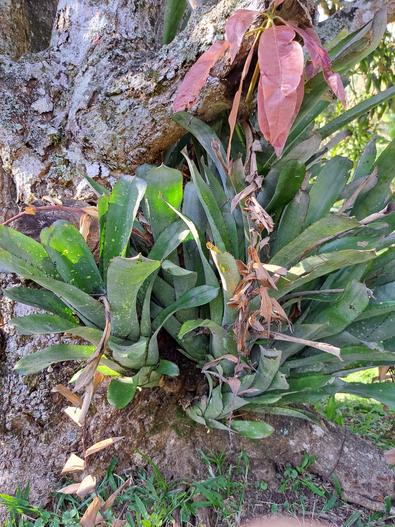Queen’s Tears
(Billbergia sanderiana)
Queen’s Tears (Billbergia sanderiana)
/
/

Victor Farjalla Pontes
CC BY 4.0
Image By:
Victor Farjalla Pontes
Recorded By:
Copyright:
CC BY 4.0
Copyright Notice:
Photo by: Victor Farjalla Pontes | License Type: CC BY 4.0 | License URL: http://creativecommons.org/licenses/by/4.0/ | Occurence ID: https://www.gbif.org/occurrence/4022006538 | Publisher: Inaturalist |

Estimated Native Range
Summary
Billbergia sanderiana, commonly known as Queen’s Tears, is an evergreen perennial herb native to the Atlantic Forest of southeastern Brazil, where it thrives in humid, shaded environments often as an epiphyte on trees. It typically grows to a height of 2 feet (0.6 meters) and a width of 1 foot (0.3 meters). The plant has a striking appearance with narrow, arching leaves that form a rosette, and it produces drooping clusters of tubular flowers that are pink and green, often with blue petal tips, in the spring. The flowers are quite showy and are followed by small, inedible fruits.
Queen’s Tears is valued for its unique, pendulous inflorescences and ease of care, making it a popular choice for hanging baskets and as an indoor ornamental in cooler climates. It is adaptable to a range of light conditions, from full sun to part shade, but prefers bright, indirect light. While it requires medium amounts of water, it is important to allow the soil to dry out slightly between waterings. The plant benefits from high humidity and can be grown in well-draining soil or even mounted on bark or wood to mimic its natural epiphytic growing conditions. It is generally pest-resistant but can be susceptible to scale insects and root rot if overwatered.CC BY-SA 4.0
Queen’s Tears is valued for its unique, pendulous inflorescences and ease of care, making it a popular choice for hanging baskets and as an indoor ornamental in cooler climates. It is adaptable to a range of light conditions, from full sun to part shade, but prefers bright, indirect light. While it requires medium amounts of water, it is important to allow the soil to dry out slightly between waterings. The plant benefits from high humidity and can be grown in well-draining soil or even mounted on bark or wood to mimic its natural epiphytic growing conditions. It is generally pest-resistant but can be susceptible to scale insects and root rot if overwatered.CC BY-SA 4.0
Plant Description
- Plant Type: Herb
- Height: 0.5-1 feet
- Width: 0.5-1 feet
- Growth Rate: Moderate
- Flower Color: Pink, Green
- Flowering Season: Spring
- Leaf Retention: Evergreen
Growth Requirements
- Sun: Full Sun, Part Shade
- Water: Medium
- Drainage: Fast
Common Uses
Bird Garden, Low Maintenance, Potted Plant
Natural Habitat
Native to the Atlantic Forest of southeastern Brazil, thriving in humid, shaded environments
Other Names
Common Names:
Scientific Names: , Billbergia sanderiana, Billbergia amoena var. cylindracea, Billbergia amoena var. penduliflora,
GBIF Accepted Name: Billbergia sanderiana É.Morren